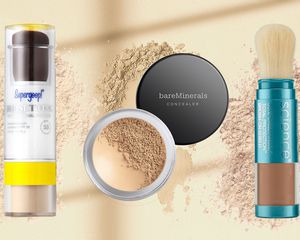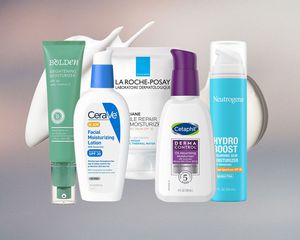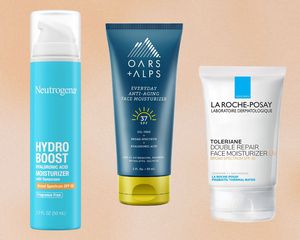:max_bytes(150000):strip_icc()/Stocksy_txp27d7197fjwe300_Medium_4071669-737bbfb6a25649af9dc8ef0340046f4c.jpg)
Stocksy
Like the skin on your face, your scalp needs sun protection. That's why using scalp sunscreen should be a regular part of your skincare regimen. But, of course, incorporating it into your daily routine may not be as straightforward as, say, your standard sunblock. For instance, you may be wondering what's the best type of scalp sunscreen and how you even apply SPF on your scalp in the first place. So to learn more, we tapped dermatologists Sara Ge and Orit Markowitz, who filled us in on everything we need to know about scalp sunscreen.
Meet the Expert
- Sarah Gee, MD, is a Harvard-trained board-certified dermatologist and the co-founder of Austin Skin.
- Orit Markowitz, MD, is a board-certified dermatologist and the founder of OptiSkin in New York City.
Can Your Scalp Become Sunburned?
The short answer? A resounding yes from both of our experts. The skin on your scalp is just as susceptible to burning as skin elsewhere on the body. "Any part of your exposed skin can become sunburnt," Markowitz shares. Gee explains that scalps can get very severe sunburns. "Areas especially vulnerable to sunburns are areas with less dense hair coverage, the back of the scalp/neck, and the juncture between the forehead and scalp. Scalp sunburns are especially common in people who have red hair and freckles, who have autoimmune diseases such as lupus, who are taking certain medications (e.g., St John's Wort, certain high blood pressure medications, or particular antibiotics), and who have various forms of hair loss," she explains.
Is Your Scalp At Risk for Skin Cancer?
Skin cancers on the exposed parts of the scalp are common. "80% of annual skin cancers occur on the head and neck—that includes exposed areas on the scalp (hairline and part line)," Markowitz tells us. Gee adds that most skin cancers are due to chronic sun exposure and the DNA mutations that can arise. "These can present as scaly, sore, or non-healing spots. For many patients without hair with long and repeated sun exposure, skin cancers are often much more likely on the scalp than the rest of the body," Gee explains. Gee also warns that melanomas detected on the scalp are more deadly than melanomas detected on other body parts.
What makes scalp skin cancers so dangerous is that they are often overlooked, both in self-exams and even at the dermatologist's office, says Markowitz. Regarding the former, many times, people forget that the skin on our scalp is exposed to the sun and/or skip the area because it is a difficult place to self-examine. And dermatologists should be doing thorough skin exams; this isn't always the case. "I find that far too many take a twirl-and-look approach versus actually taking the time to examine your skin and scalp properly with a dermatoscope," confesses Markowitz. "A dermatoscope is a hand-held microscope with double magnification and polarized lighting that allows us to look at your skin more clearly. You'd be shocked to hear that only 50% of dermatologists use this."
Both experts share that hairdressers are their greatest allies when it comes to scalp skin cancers. "Studies show that educating hairdressers can be lifesaving. The skin cancer foundation actually started an educational program called 'Heads Up!' to provide dermatology education to beauty professionals, including hairstylists," Gee comments. Markowitz says you can ask your hairstylist or even a friend to look at your scalp as they do your hair and ask them to point out anything that might be suspicious, and then you can follow up with a visit to your dermatologist. "I have seen several patients where their haircut has saved their life," Gee cautions.
Do You Need to Wear Sunscreen on Your Scalp?
Yes, you need to wear a good sunscreen on your scalp if you will be outdoors for a long time, Markowitz cautions. While your hair provides coverage to protect your scalp, the parts of your scalp that are exposed, like your hairline and part line, are at an increased risk of developing cancer, so wearing sun protection is critical. Gee adds that covering babies' and kids' scalps is especially important because their hair is fine and their skin is vulnerable. Also, those who have thin hair are more likely to experience burning due to the lack of protection provided by the hair.
"A full head of hair can somewhat block the sun's rays from directly hitting the scalp, but UV radiation is powerful and often finds a way on there," says Gee. Studies have shown that the color of hair does not make a huge difference, but the thickness and caliber of the hair might. Markowitz also cautions that it is still important for those with thick hair to get their scalp checked during skin exams because melanoma isn't always linked directly to sun exposure.
How to Apply Sunscreen on Your Scalp
Both experts recommend applying a dedicated scalp sunscreen to your hairline and part line. It only needs to be applied to the whole scalp if your hair is thin or you have bald patches. "I always say the best SPF is the one you're going to use, and most people are not inclined to use a cream or lotion on their head," says Markowitz. "This is why I recommend powdered sunscreens," says Markowitz. They offer great protection for the scalp and act like a dry shampoo, leaving no greasy residue in the hair, making it a great option.
"Another great alternative if you don't like the powder formulas are scalp sprays like Coola's Scalp & Hair Mist," Markowitz shares. You can spray this on your hairline, part line, and all over your hair without leaving behind a greasy residue."
To keep your scalp sunburn-free, Gee recommends Supergoop! Poof 100% Mineral Part Powder. With star ingredient, zinc oxide, this two-in-one dry shampoo and sunscreen will leave both scalp and hair protected sans greasy residue. Gee also recommends that patients with little hair and who are at high risk for skin cancers use zinc- or titanium-based face sunscreen or body sunscreen on their scalp, such as the Vacation Classic Spray SPF 50.
Byrdie Tip
Not keen on applying sunscreen to your scalp? Both experts share that hats are a great alternative as long as you ensure they provide adequate "UPF" or "Ultraviolet Protection Factor." According to Gee, a wide-brimmed hat is the best form of sun protection.
The Takeaway
Scalp skin is especially vulnerable to sunburns and dangerous forms of melanoma, so applying sunscreen to your scalp is an absolute must. While traditional sunscreen lotions and creams may be unpleasant to apply, there are mist and powder formulations that are designed for use on the hairline and part line.



